2025
What’s next for the Local Plan?
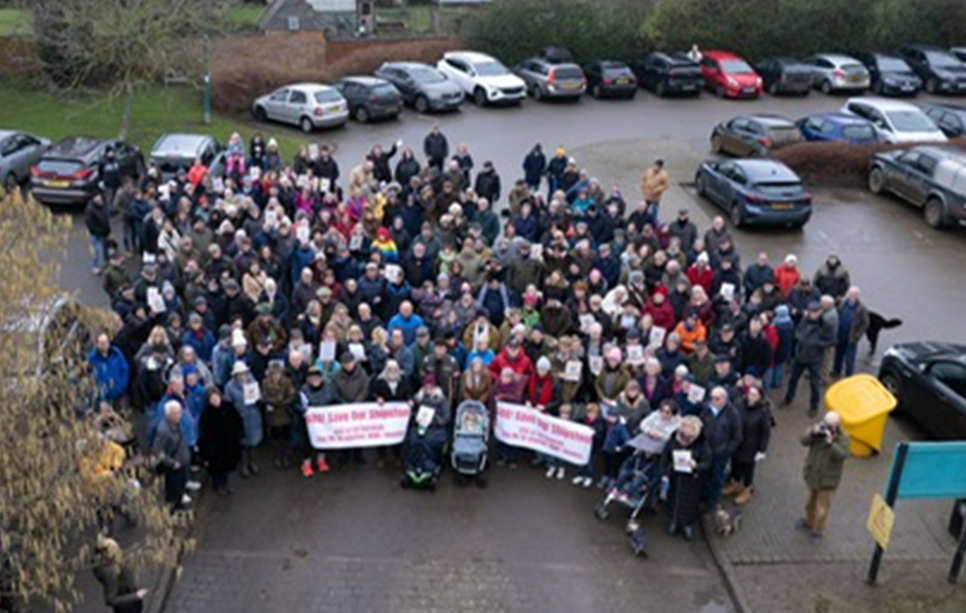 The deadline for responses to the South Warwickshire Local Plan has now passed, after Stratford District Council and Warwick District Council completed their public consultation of Part 1 of the plan on 7th March. Within the plan, 14 sites around Shipston have been identified as potential development areas for approximately 3,000 houses.
The deadline for responses to the South Warwickshire Local Plan has now passed, after Stratford District Council and Warwick District Council completed their public consultation of Part 1 of the plan on 7th March. Within the plan, 14 sites around Shipston have been identified as potential development areas for approximately 3,000 houses.
The Town Council has objected strongly to the level of landowner/developer proposed development, mainly on the grounds of inadequate existing infrastructure.
Meanwhile, the Save Our Shipston campaign has been working hard to help residents understand the potential impacts of the proposed development plan and encouraging people to submit their personal responses.
“We now await a decision at the end of the year to determine whether Stratford and Warwickshire District Councils will be persuaded that Shipston is not an appropriate site for such a large-scale development,” said a spokesperson.
Cllr Paul Tesh explains the procedure and the Town Council response on page 3 of The Shipston Forum while Save our Shipston sets out how they have campaigned on page 8.
No beds at the Badger
The NHS Coventry and Warwickshire Integrated Care Board (ICB) has announced that there will be no beds at the Ellen Badger hospital in Shipston.
Following a decision made at an ICB Board meeting on 19th March, the 35 community rehabilitation beds in South Warwickshire will be permanently located at two sites, Leamington Spa Hospital and Stratford Hospital – a continuation of current arrangements, which have been in place since works began at the Ellen Badger in January 2022.
This went against the very clear preference of the town and surrounding area. Responses to the six-week consultation process showed 82% in favour of having beds in three hospitals including Shipston’s Ellen Badger.
The ICB has recognised the need for a wider consideration of health services for rural communities and will now adopt a “whole system approach to engagement with communities, prioritising rural communities initially.”
The Beds for Badger organising committee has responded by saying: “We must now use this opportunity to get the focus on patient-centred care in our rural community.”
The ICB Board and NHS provider SWFT will now work in partnership to develop a full implementation plan. Read more about the Beds for Badger Campaign’s reaction on page 5 of the Shipston Forum.
Victory in Europe 80th Anniversary
The Shipston-on-Stour Branch of the Royal British Legion will be supporting the town council in celebrating the 80th Anniversary of Victory in Europe on Thursday, 8th May.
Throughout the day, there will be a variety of town activities, such as:
0800 - Proclamation in the town square
0900 - Flag raising and small ceremony at the Gyratory
1200-1400 - Lunch at the Warm Hub (Scout Hut)
1500 - Declaration by Sir Winston Churchill 1530 - Shop window decoration competition.
1800 - Party at Low Furlong (Food, Bar, Music)
2030 - Music at the Beacon
2130 - Lighting of the Beacon
This will be a great occasion for the town to come together and celebrate in the spirit of 1940s Britain! We look forward to seeing you all on the day. And there’s more to come as well, so stay tuned!
If you’re interested in coming to the VE Day celebratory lunch at the Warm Hub from 12 noon to 2pm on 8th May, please let Rowena Webb know as soon as possible on 07967 479375 as spaces are limited. Alistair Watkins Secretary, Royal British Legion, Shipston branch.
Local Plan Consultation
Consultation is now ongoing on the emerging Local Plan for South Warwickshire that is being prepared jointly by Stratford-on-Avon and Warwick District Councils. The Local Plan sets out the strategic vision, objectives and spatial strategy for the South Warwickshire area as well as the planning policies that will determine the future location, scale, type and design of new development up to 2050.
It will, according to the online consultation document, ‘set out the overall strategy for the pattern, scale and design quality of places within South Warwickshire, and make sufficient provision for housing, employment, retail, leisure and other commercial development, along with infrastructure, community facilities, conservation and enhancement of the natural, built and historic environment and planning measures to address climate change mitigation and adaptation.’
A group called SOS! Save Our Shipston! has been set up and is encouraging as many people as possible to take part in the consultation. The group has set out more details, including the five main policies underpinning the plan, and how to respond, on page 8 of the March Forum. The deadline for responses is Friday 7th March.
Beds decision due in March
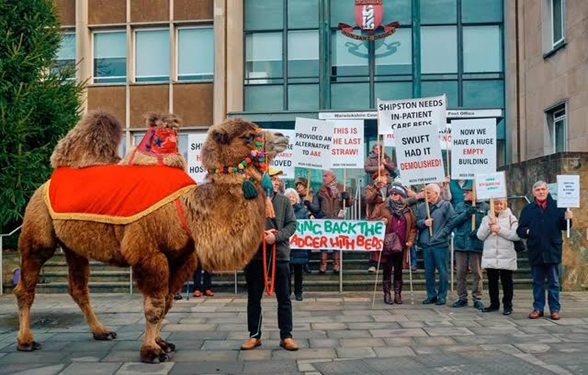 The past two months have seen intense scrutiny of local healthcare options as the consultation over beds in the Ellen Badger Hospital got underway, including an event in town.
The past two months have seen intense scrutiny of local healthcare options as the consultation over beds in the Ellen Badger Hospital got underway, including an event in town.
Feedback on the consultation is now expected around 6th March, with a decision on the issue at the board meeting of the Integrated Care Board on 19th March.
This will be keenly awaited by many in town, not least the Beds for Badger campaign, who brought along Baxter the camel to make their point outside the January meeting of the adult care and health overview and scrutiny committee at the Warwick Shire Hall.
The striking appearance of the two-humped ship(ston?) of the desert helped attract coverage in local press and television.
Nature needs our help
 Many years of development, habitat loss and persecution has resulted in the UK being one of the most nature-depleted countries on Earth. One in six species are threatened with extinction in Britain. Insects of all kinds, especially those which pollinate important food supplies such as bees, are in decline.
Many years of development, habitat loss and persecution has resulted in the UK being one of the most nature-depleted countries on Earth. One in six species are threatened with extinction in Britain. Insects of all kinds, especially those which pollinate important food supplies such as bees, are in decline.
Changes in farming methods and recent climate change are the biggest causes of wildlife decline. So, what can we do about it in Shipston? How can you help?
Gardeners can help in several ways: by leaving a patch of garden to be a bit wild; letting grass grow a bit longer by mowing less often and allowing lawn weeds to flower (the much-abused dandelion and clover provide pollen for our bees and other insects). Try planting garden flowers that provide forage for a wide variety of pollinating insects eg foxglove, aster, nasturtium, and putting a shallow dish of water out for garden visitors such as birds, hedgehogs and many more. Please avoid using deadly chemical sprays!
Even if you don’t have a garden, tubs, hanging baskets and window boxes can still create homes for wildlife. Many flowering herbs are loved by pollinators – chives, sage, lavender; even cherry tomatoes will grow in a small container so you can have some home-grown food from a tub!
For more ideas have a look at the websites of organisations such as Buglife, RHS and the Wildlife Trusts.
New Hedges for Cornmill Meadow
Hilary Kelly writes:
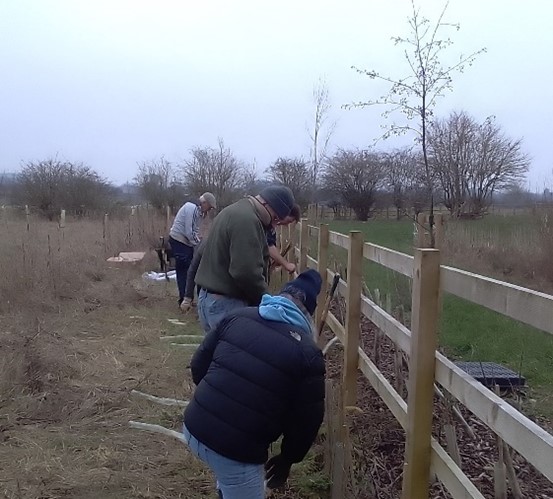 There was quite a lot of flooding last month but thankfully the River Stour retreats reasonably quickly so no real damage was done.
There was quite a lot of flooding last month but thankfully the River Stour retreats reasonably quickly so no real damage was done.
Over the winter we have planted some trees which were donated by local residents including field maple, oak, silver birch, walnut and horse chestnut.
In January two new hedges were planted, one in each meadow. We hope when these are established they will link with older hedgerows to create better wildlife corridors for the small inhabitants of the meadows.
Many thanks to the volunteers who turned out to dig and plant on a Saturday morning.
Watch out for further opportunities to help our local wildlife site in the future.
A Conductor’s Thoughts
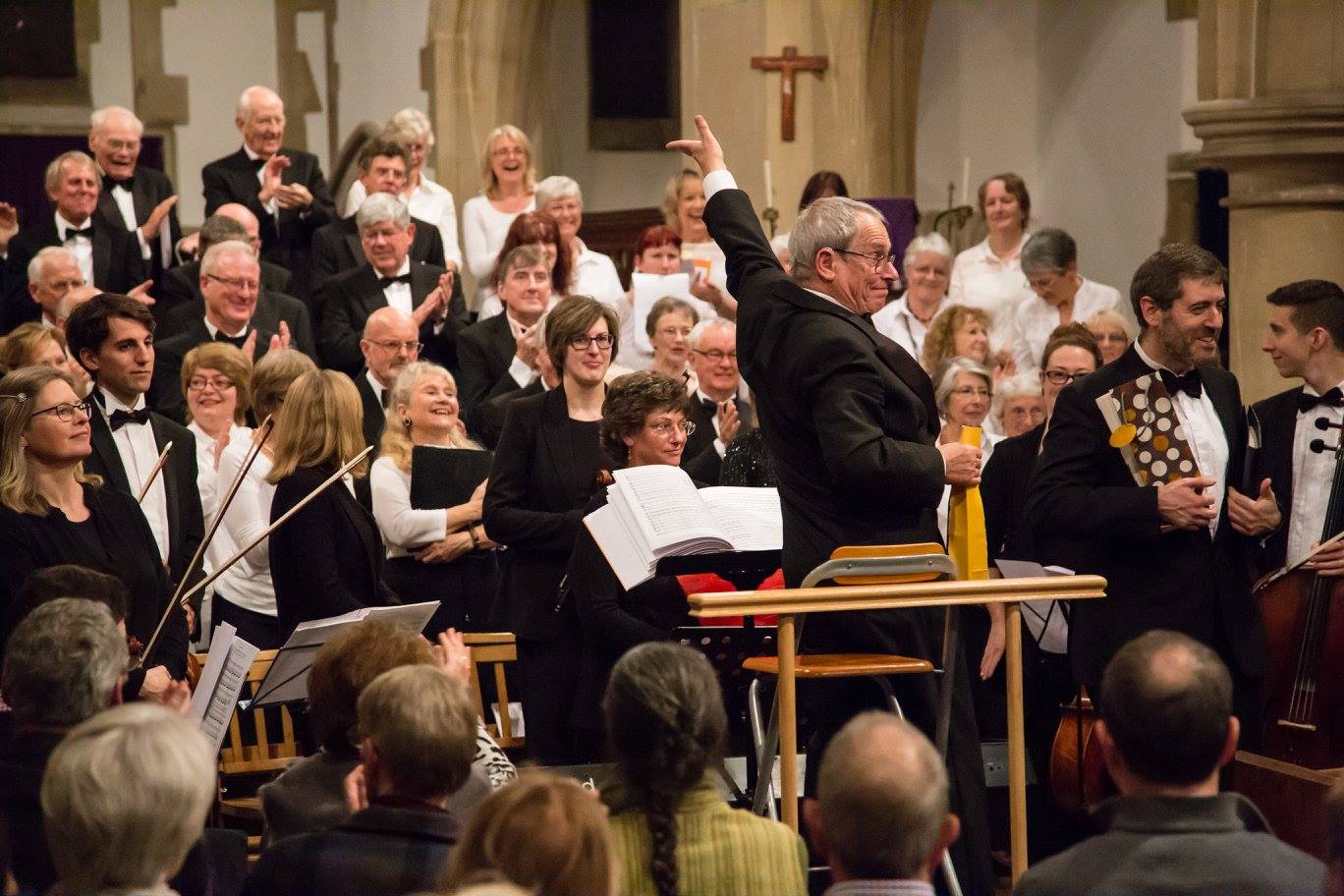 Richard Emms, who has led the Stour Singers for half a century, has announced he will be retiring in May.
Richard Emms, who has led the Stour Singers for half a century, has announced he will be retiring in May.
Starting with a small band of madrigal singers, he has grown the choir until it now performs with professional soloists and the Royal Birmingham Conservatoire orchestra.
Here, Richard reflects on his decades leading this ‘unusually disciplined and expressive’ choir:
Where’s the choir? That was one of my first thoughts about Shipston when I settled here with my family 50 years ago. Shipston had – still has! – an excellent band, but there was no equivalent choir.
As Head of Music at Shipston Community School, as the High School was known then, I thought it right that I should address this lack, and so ran an evening class on madrigal singing. Great fortune: we had a perfectly - balanced mixed choir of 15 singers. The year after, I decided to work without fee; the choir snowballed and acquired its name, Stour Singers. During the first five years the choir was already attracting some very able singers and we reached the point where I thought: ‘We can tackle the big stuff.’ So after testing the ground with Vivaldi’s Gloria, we embarked on a performance of Haydn’s Creation, with orchestra and our own soloists....and the choir has never looked back. It had become, in effect, Shipston’s Choral Society.
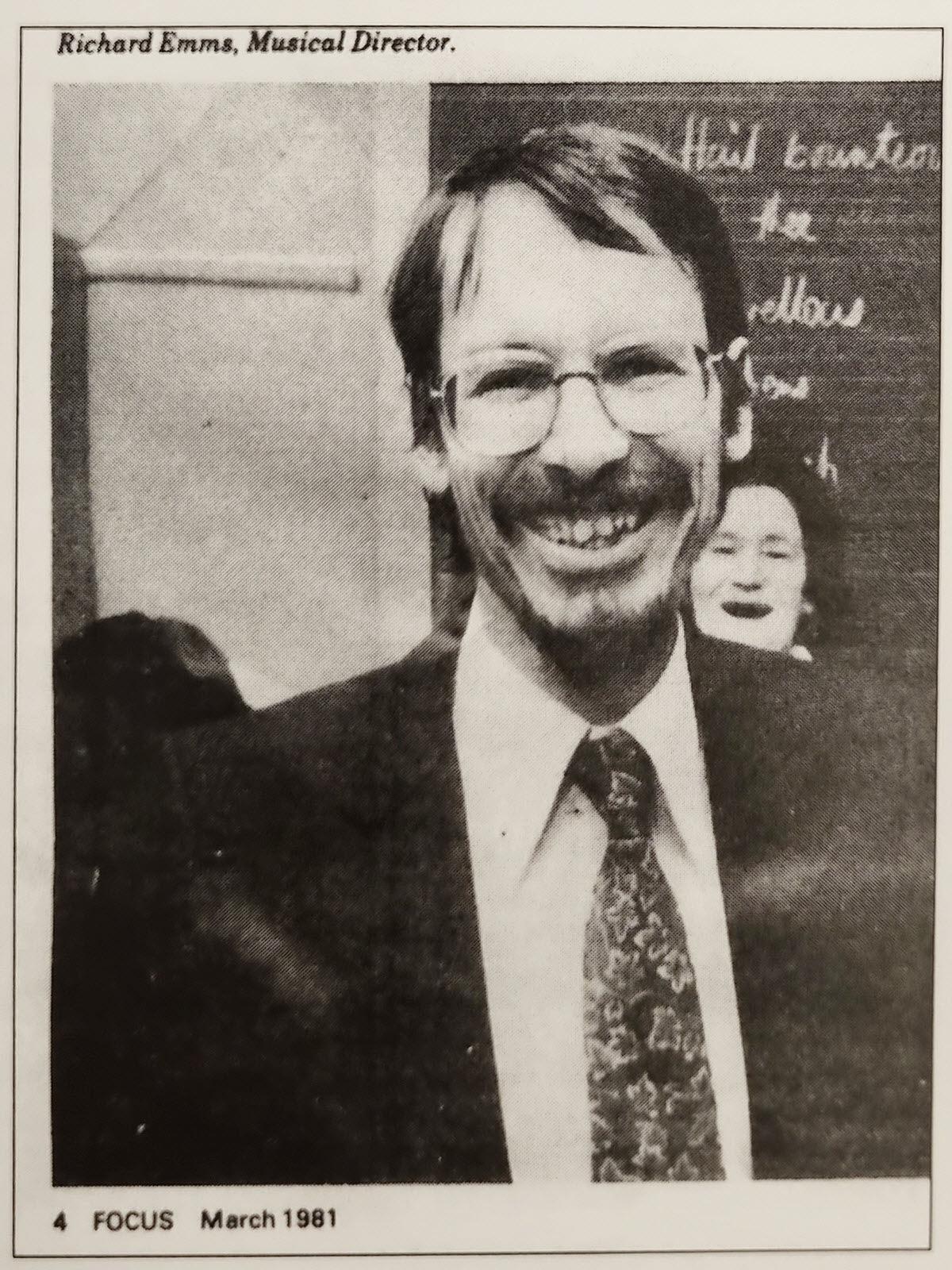 Now, of course, we have professional soloists, most of whom appear on concert platforms and in opera houses across Europe, and we have a lively collaboration with the Royal Birmingham Conservatoire which provides our orchestra. The 40-odd years between have been something of an adventure with huge highs and the inevitable lows. Barry Draycott and Richard Jenkinson at different times rescued the choir when I was ill. And then there was the dreaded Covid: we had 83 members before, and 30 after! But I notice the choir recovers all the stronger after setbacks, and it now has about 50 very committed members and a really business-like committee who run it. The choir’s performance last Christmas was unusually disciplined and expressive for an amateur choir – you wouldn’t guess they had not been auditioned.
Now, of course, we have professional soloists, most of whom appear on concert platforms and in opera houses across Europe, and we have a lively collaboration with the Royal Birmingham Conservatoire which provides our orchestra. The 40-odd years between have been something of an adventure with huge highs and the inevitable lows. Barry Draycott and Richard Jenkinson at different times rescued the choir when I was ill. And then there was the dreaded Covid: we had 83 members before, and 30 after! But I notice the choir recovers all the stronger after setbacks, and it now has about 50 very committed members and a really business-like committee who run it. The choir’s performance last Christmas was unusually disciplined and expressive for an amateur choir – you wouldn’t guess they had not been auditioned.
And: there have been for me unexpected discoveries. Yes, I have set in motion a group who come together to make music. But it’s not just the music, it’s the people. Of course, it’s the individual skills and personalities they bring to the choir, but singing in choirs lifts the spirits, fires the imagination, promotes health (for some it has been a life-saver), and brings people together to make new friends. When I look at the choir from the rostrum, I see a complicated knot of groups of friends. That, and their enthusiasm, is what makes them such a joy to work with.
My dream was that the choir should become an established part of Shipston’s music culture. It clearly can stand on its own feet. We have found my very promising successor, Alex Silverman: a man, young, and of considerable musical gifts and charisma. This year in May is a good time to retire and hand over the choir in good heart. Perhaps my dream may have come true?
Tribute to David Burge
 A true friend to Shipston was lost when David ‘Dick’ Burge died on 27th November, aged 87.
A true friend to Shipston was lost when David ‘Dick’ Burge died on 27th November, aged 87.
His long time commitment to having a Shipston museum, together with co-founder Mike Ashley, was the foundation of the Shipston museum we have today. He sometimes said with a smile: “As long as I live long enough to see the Museum re-open!”
So it was a very special day when he cut the ribbon to open the doors of our museum two years ago to see that hope realised.
Trustee chair Bekky Hillman paid tribute to fellow trustee Dick: “His passion for history and archaeology and his local knowledge was second to none. I hope that the museum and the Historical Society will remain a tribute to him and Mike, and we will try to maintain his values in everything we do going forward.”
At the funeral his children John and Helen who were over from Australia paid tribute to ‘Pops’. Then a poem, written by former colleague Frank Storr when Dick left consulting firm IDC to join Warwickshire Highways was read, including the lines:
No more the smile of cynicism, often wry
Behind those narrow eyes the wit -ah, how dry!
So practical his thinking, yet so deep
That many a time thought he had fallen asleep!
Local friend Pete Cox also paid tribute to this truly remarkable man: “Dick Burge—a man whose love for Shipston-on-Stour has left an enduring mark on this town and its people. Dick was more than a resident; he was a steward of Shipston’s history, a storyteller of its past, and a guardian of its heritage. Through his tireless efforts, he ensured that the stories, artefacts, and memories that define our town were not lost to time, but preserved to be celebrated for generations to come. “Dick was not content to merely collect history; he sought to bring it to life. Whether uncovering forgotten documents, cataloguing cherished artefacts, or sharing fascinating stories, his work was always a labour of love. He understood that history isn’t just about dates and events—it’s about people, community, and identity. Through his dedication, he made sure that Shipston’s rich tapestry of life, work, and culture would never be forgotten. Dick having just cut the ribbon
But beyond his remarkable contributions to history, Dick was a kind-hearted and generous soul. He had a knack for connecting with people, for listening and learning, and for sharing his enthusiasm in a way that inspired others. opening Shipston Museum - the realisation of his hope to see it brought alive again.
Thank you, Dick, for everything you have given us. You will always hold a special place in the heart of Shipston-on-Stour. Rest in peace.”


